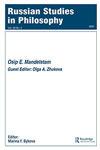The Split Existence: (An Analysis of F.M. Dostoevsky’s The Double)
IF 0.1
4区 哲学
Q4 Arts and Humanities
引用次数: 0
Abstract
ABSTRACT This article analyzes the existential situation of the protagonist of The Double from the position of its manifestation in the discourse he undertakes. Dostoevsky exacerbates the problem of the crisis of self-consciousness, a complex collision of personal and social being, showing the risk of a split identity that leads to insanity, largely associated with the tension between supra-individual value constructs and the lifeworld. “Doubling” is a vivid artistic means for conveying the deep meaning of the polyphony of the Self, which can be split under the influence of insurmountable social and existential contradictions. The story suggests two forms for reconstructing a person’s consciousness of self: discourse and text. Discourse is revealed in dialogue with others and with an Other; the self-text is created by man as the author of his own life story disentangling his experiences. The protagonist fails to cope with the discursive conflict largely because he is unable to construct a story allowing him to balance the voices that speak within him, to create a personal polyphony, and to overcome existential and ontological disaster. The protagonist’s dialogue with the doctor is an attempt to disentangle his existence and create this kind of story through an appeal to a real Other. However, Dostoevsky cannot see the proper cultural ground for this disentangling in the protagonist and his environment; he proposes no cultural resources, showing the “little man” as rootless, “without portents,” at the mercy of fatal chance, of an ill-starred mundanity, of spiritual chaos, “abandoned in the world.”分裂的存在(陀思妥耶夫斯基《双重人格》解析)
本文从《双生》中主人公在话语中的表现位置出发,分析了主人公的存在处境。陀思妥耶夫斯基加剧了自我意识危机的问题,这是个人与社会存在的复杂碰撞,显示了导致精神错乱的身份分裂的风险,这在很大程度上与超个人价值建构与生活世界之间的紧张关系有关。“双重”是一种生动的艺术手段,它传达了自我复调的深层含义,这种复调在无法克服的社会矛盾和存在矛盾的影响下可以分裂。这个故事提出了重建一个人的自我意识的两种形式:话语和文本。话语在与他人和他者的对话中显露出来;自我文本是人作为自己的生活故事的作者,通过自身的经历而创造出来的。主人公无法处理话语冲突,很大程度上是因为他无法构建一个故事,让他能够平衡自己内心的声音,创造一个个人的复调,并克服存在主义和本体论的灾难。主人公与医生的对话是试图解开他的存在,并通过对真实他者的呼吁来创造这种故事。然而,陀思妥耶夫斯基在主人公和他所处的环境中看不到这种解脱的文化基础;他没有提出任何文化资源,把“小人物”描绘成无根的、“没有预兆的”、受致命机遇的摆布、受不幸的世俗、精神混乱的摆布,“被遗弃在世界上”。
本文章由计算机程序翻译,如有差异,请以英文原文为准。
求助全文
约1分钟内获得全文
求助全文
来源期刊

RUSSIAN STUDIES IN PHILOSOPHY
PHILOSOPHY-
CiteScore
0.10
自引率
0.00%
发文量
14
期刊介绍:
Russian Studies in Philosophy publishes thematic issues featuring selected scholarly papers from conferences and joint research projects as well as from the leading Russian-language journals in philosophy. Thematic coverage ranges over significant theoretical topics as well as topics in the history of philosophy, both European and Russian, including issues focused on institutions, schools, and figures such as Bakhtin, Fedorov, Leontev, Losev, Rozanov, Solovev, and Zinovev.
 求助内容:
求助内容: 应助结果提醒方式:
应助结果提醒方式:


